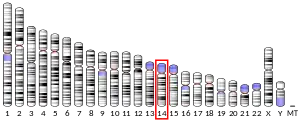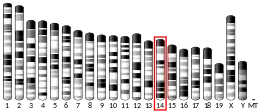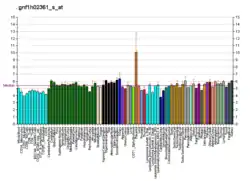Adenylyl cyclase type 4 is an enzyme that in humans is encoded by the ADCY4 gene.[5][6]
Function
This gene encodes a member of the family of adenylyl cyclases, which are membrane-associated enzymes that catalyze the formation of the secondary messenger cyclic adenosine monophosphate (cAMP). Mouse studies show that adenylyl cyclase 4, along with adenylyl cyclases 2 and 3, is expressed in olfactory cilia, suggesting that several different adenylyl cyclases may couple to olfactory receptors and that there may be multiple receptor-mediated mechanisms for the generation of cAMP signals.[6]
References
- 1 2 3 ENSG00000284814 GRCh38: Ensembl release 89: ENSG00000129467, ENSG00000284814 - Ensembl, May 2017
- 1 2 3 GRCm38: Ensembl release 89: ENSMUSG00000022220 - Ensembl, May 2017
- ↑ "Human PubMed Reference:". National Center for Biotechnology Information, U.S. National Library of Medicine.
- ↑ "Mouse PubMed Reference:". National Center for Biotechnology Information, U.S. National Library of Medicine.
- ↑ Edelhoff S, Villacres EC, Storm DR, Disteche CM (Jul 1995). "Mapping of adenylyl cyclase genes type I, II, III, IV, V, and VI in mouse". Mamm Genome. 6 (2): 111–3. doi:10.1007/BF00303253. PMID 7766992. S2CID 27766000.
- 1 2 "Entrez Gene: ADCY4 adenylate cyclase 4".
External links
- Human ADCY4 genome location and ADCY4 gene details page in the UCSC Genome Browser.
Further reading
- Gaudin C, Homcy CJ, Ishikawa Y (1994). "Mammalian adenylyl cyclase family members are randomly located on different chromosomes". Hum. Genet. 94 (5): 527–9. doi:10.1007/BF00211020. PMID 7959689. S2CID 40521157.
- Barcova M, Speth C, Kacani L, et al. (1999). "Involvement of adenylate cyclase and p70(S6)-kinase activation in IL-10 up-regulation in human monocytes by gp41 envelope protein of human immunodeficiency virus type 1". Pflügers Arch. 437 (4): 538–46. doi:10.1007/s004240050815. PMID 10089566. S2CID 7620262.
- Speth C, Joebstl B, Barcova M, Dierich MP (2000). "HIV-1 envelope protein gp41 modulates expression of interleukin-10 and chemokine receptors on monocytes, astrocytes and neurones". AIDS. 14 (6): 629–36. doi:10.1097/00002030-200004140-00001. PMID 10807185. S2CID 22105709.
- Patke CL, Shearer WT (2000). "gp120- and TNF-alpha-induced modulation of human B cell function: proliferation, cyclic AMP generation, Ig production, and B-cell receptor expression". J. Allergy Clin. Immunol. 105 (5): 975–82. doi:10.1067/mai.2000.105315. PMID 10808179.
- Wong ST, Trinh K, Hacker B, et al. (2000). "Disruption of the type III adenylyl cyclase gene leads to peripheral and behavioral anosmia in transgenic mice". Neuron. 27 (3): 487–97. doi:10.1016/S0896-6273(00)00060-X. PMID 11055432.
- Patrizio M, Colucci M, Levi G (2001). "Human immunodeficiency virus type 1 Tat protein decreases cyclic AMP synthesis in rat microglia cultures". J. Neurochem. 77 (2): 399–407. doi:10.1046/j.1471-4159.2001.00249.x. PMID 11299302.
- Côté M, Guillon G, Payet MD, Gallo-Payet N (2001). "Expression and regulation of adenylyl cyclase isoforms in the human adrenal gland". J. Clin. Endocrinol. Metab. 86 (9): 4495–503. doi:10.1210/jcem.86.9.7837. PMID 11549699.
- Speth C, Schabetsberger T, Mohsenipour I, et al. (2002). "Mechanism of human immunodeficiency virus-induced complement expression in astrocytes and neurons". J. Virol. 76 (7): 3179–88. doi:10.1128/JVI.76.7.3179-3188.2002. PMC 136041. PMID 11884542.
- Strausberg RL, Feingold EA, Grouse LH, et al. (2003). "Generation and initial analysis of more than 15,000 full-length human and mouse cDNA sequences". Proc. Natl. Acad. Sci. U.S.A. 99 (26): 16899–903. Bibcode:2002PNAS...9916899M. doi:10.1073/pnas.242603899. PMC 139241. PMID 12477932.
- Ludwig MG, Seuwen K (2003). "Characterization of the human adenylyl cyclase gene family: cDNA, gene structure, and tissue distribution of the nine isoforms". J. Recept. Signal Transduct. Res. 22 (1–4): 79–110. doi:10.1081/RRS-120014589. PMID 12503609. S2CID 36697419.
- Ota T, Suzuki Y, Nishikawa T, et al. (2004). "Complete sequencing and characterization of 21,243 full-length human cDNAs". Nat. Genet. 36 (1): 40–5. doi:10.1038/ng1285. PMID 14702039.
- Gerhard DS, Wagner L, Feingold EA, et al. (2004). "The status, quality, and expansion of the NIH full-length cDNA project: the Mammalian Gene Collection (MGC)". Genome Res. 14 (10B): 2121–7. doi:10.1101/gr.2596504. PMC 528928. PMID 15489334.
This article is issued from Wikipedia. The text is licensed under Creative Commons - Attribution - Sharealike. Additional terms may apply for the media files.




